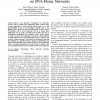Free Online Productivity Tools
i2Speak
i2Symbol
i2OCR
iTex2Img
iWeb2Print
iWeb2Shot
i2Type
iPdf2Split
iPdf2Merge
i2Bopomofo
i2Arabic
i2Style
i2Image
i2PDF
iLatex2Rtf
Sci2ools
CRISIS
2009
2009
A secured delegation of remote services on IPv6 home networks
IPv6 is an attractive technology for innovative services such as health care monitoring, alarm systems, peer to peer applications, virtual machine systems and so on. The generalization of end to end paradigm, possible due to the length of IPv6 addresses, eases the deployment of such services. Nevertheless end to end connection can be a threat since application can be easily accessible from outside and thus a compromised application may endanger others. In this paper, we study some of the advantages of using the IPv6 protocol in home networks but most particularly how to improve the security of home networks. We present an architecture allowing the definition of a partition between groups of applications and where communication between these groups is not permitted if there is no explicit delegation. We overview the key points of the current implementation and some initial results of our approach. Keywords--Home Networking; IPv6; Network Security; Access Control.
Related Content
| Added | 17 Feb 2011 |
| Updated | 17 Feb 2011 |
| Type | Journal |
| Year | 2009 |
| Where | CRISIS |
| Authors | Stere Preda, Laurent Toutain, Nora Cuppens-Boulahia, Frédéric Cuppens, Joaquín García-Alfaro |
Comments (0)

